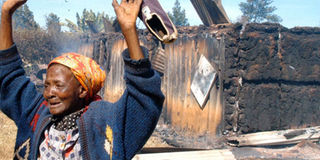Four counts of crimes against humanity DP Ruto, Sang faced in the ICC

A woman cries outside the Kiambaa church in which several people were burnt to death during the post-election violence of 2008. Survivors of the 2008 post-election violence in Rift Valley expressed fears that when the cases collapse their hopes for justice and compensation will be dashed. PHOTO | FILE | NATION MEDIA GROUP
What you need to know:
According to the prosecution’s case, Mr Ruto and Mr Sang formed a “Network” way back in 2006.
The prosecution claimed the "Network" intended to uproot the Kikuyu, Kisii and Kamba communities from the Rift Valley to create an ODM zone.
Mr Ruto was a member of the ODM Pentagon, the party’s topmost organ.
Mr Sang allegedly used his programmes on Kass FM to incite locals and preach violence, the prosecution argued.
Deputy President William Ruto and former radio presenter Joshua Sang faced four counts of crimes against humanity — murder, deportation or forcible transfer of population, torture and persecution.
They were accused of committing the crimes as indirect co-perpetrators at several places, including Turbo Township, the greater Eldoret area, Kapsabet and Nandi Hills towns.
According to the prosecution’s case, Mr Ruto and Mr Sang formed a “Network” way back in 2006, with the stated purpose of uprooting the Kikuyu, Kisii and Kamba communities from the Rift Valley to create an ODM zone.
Mr Ruto was a member of the ODM Pentagon, the party’s topmost organ.
The prosecutor told the court that on April 15, 2007, the defendants organised a ceremony in Molo, where members of “The Network” swore an oath to implement the plan.
"COMMON PLAN"
Further meetings were said to have been held in subsequent days, including at Mr Ruto’s house in Eldoret Town.
The prosecution claimed that at one such meeting on December 22, 2007, five days to the General Election, guns and money were given out to “The Network” to implement the “common plan.”
Mr Sang allegedly used his programmes on Kass FM to incite locals and preach violence, the prosecution argued.
“The Network” launched several attacks in the greater Eldoret Town, covering Turbo, Huruma, Kiambaa, Kimumu, Langas and Yamumbi areas, resulting in dozens of deaths, it was claimed.
In one such incident, it was alleged, “The Network” attacked a church in Kiambaa, where members of the targeted communities had sought refuge, locked the doors from outside and set it on fire.
The prosecutor also alleged that Kapsabet and Nandi Hills towns were attacked.
“The Network” also attacked non-Kalenjins in Turbo, Eldoret, Kapsabet and Nandi Hills and destroyed their homes and businesses in the aftermath of the disputed election.
Mr Ruto’s defence team led by Mr Karim Khan, however, argued that the prosecution had been unable to prove its theory that its client headed “the Network” that planned, organised and financed the violence in Uasin Gishu and Nandi in the Rift Valley region.
Mr Khan argued that during the pre-trial stage, the prosecution claimed it had evidence to prove that “the Network” comprised a military, political and financial wing, an argument it failed to sustain as the trial progressed.
Over time, Mr Khan said, the prosecution stopped making reference to the so-called military wing and only made little reference to the political and financial wings.
In reference to three meetings Mr Ruto allegedly held at his Eldoret home, Mr Khan said the defence offered evidence, showing that the DP was at places other than his residence.
He said the dates the witnesses gave for the meetings corresponded with the campaign period, leading up to the December 2007 election and there was a lot of media coverage of those campaigns.
It was, therefore, unlikely that Mr Ruto could have held the meetings away from media scrutiny, he stated.
Mr Khan also referred to a prosecution witness who testified about a cleansing ceremony for Kalenjin youth who participated in the violence.
He said the testimony that Mr Ruto’s aide, Mr Farouk Kibet, attended the ceremony and paid the youths for participating in the violence was “fictitious”.
He said the testimony was unsupported by other evidence.
“It doesn’t show anything that could support an allegation of individual criminal responsibility,” Mr Khan said.





